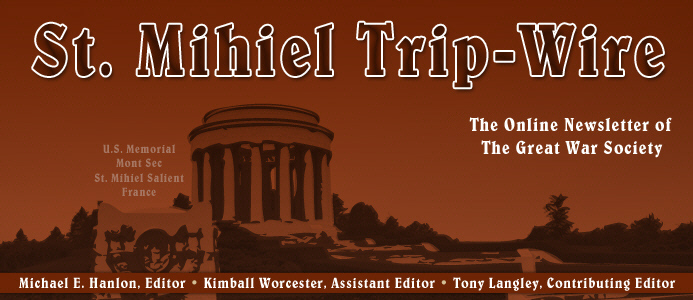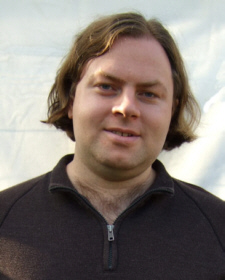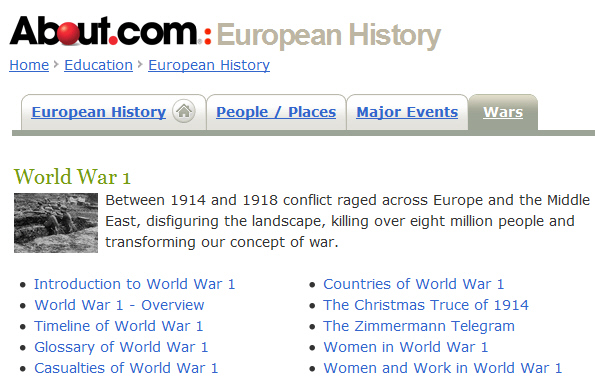

EMail Interview with About.com |
 Robert Wilde |
2. As we approach the centennial of the start of the First World War our organizations are trying to identify how the events of 1914-1918 helped shape the world of today. What are your thoughts on that?
RW: I think the war helped to shape the twentieth century to a greater extent than any other event. To start with, you have the origins of the two great power blocs which would win the Second World War and fight the Cold War. Tsarist Russia may have collapsed eventually anyway, but it was the war which toppled it and ushered in the first socialist revolution, and the results of that are still with us in China. Equally, the US took a major step towards becoming a global superpower as west Europe declined and the US rose, growing into its current dominant position.While I don't believe the end of World War 1 made World War 2 and all consequent developments inevitable, it certainly enabled them to happen, and you had the transformation of central Europe from empires into young democracies which would prove fertile ground for dictators. These countries and democracies reappeared after 1945 and 1989, shaped modern Europe and will continue to as they join the EU. You also had the collapse of the Ottoman Empire and renewed western influence in the Middle East, which would lead - although I'm sure people would argue the extent - into the current problematic situation.
While I think the last few years have changed the political situation to a step away from the war, the conflict seems closely bound up with changes in society which are still present, such as the step forward in women's votes. Modern war was certainly ushered in with the first tanks and, perhaps of greater important for the ways in which the west now fights, airpower.
3. How do you reply to inquiries from young people who wonder why it's necessary to study history in general, or why Americans should be interested in European History?
RW: The obvious cliché is that you need to study history to understand the world around you, but I think it's very true. I'd also hope young people would find the events of history to be as exciting and tragic, dramatic and thought provoking as any novel, film or computer game.In terms of the second part of your question, with the history of modern America you start with waves of European immigration, through a founding war where Europeans fought on both sides, and through more immigration. Europe is thus closely tied to the formation of the US, and I think you need to understand both. America has gone a long way to inventing a culture which is now being adopted by Europe, there's still a lot within it that comes from Europe originally. In terms of World War 1, I'm not sure Americans need a better reason to study it than the involvement of US soldiers, but as a shift in power and the rise to superpower status of the US partly occurred during conflicts on European soil then those European wars ought to be understood by Americans.

Robert Wilde's World War I Portal
(click on image to visit)
4. Let's look at history as biography - Which personalities of the Great War most interest you? What are some of your favorite biographies, memoirs, etc.?
RW: In terms of personality, Kaiser Wilhelm is an interesting figure, outwardly very martial and proud to be at the forefront of this belligerent cultural ideal, but he almost retreats when the war begins and ends up as a figurehead. You might have expected him to have a greater input, if not try to mimic ancestors like Frederick 'the Great'. In terms of biographical works and memoirs, I love the poems of Wilfred Owen. As expressions of one man's terror, sadness and anger they are masterpieces, and as records of someone's wartime experiences they are vital in our understanding of the war. Rightly or wrongly they shaped the modern impressions of WW1 and while I understand people who grow frustrated with them as giving a false impression, I think they're powerful enough to demand to be read.5. Thank you for recommending some of the Websites we produce and maintain. What is missing in the subnetwork of WWI websites that you would like to see added for students and researchers?
RW: The internet is a great multi-media resource, so I'd like to see more film footage online, for free. While I still have faith that students read - and you do see the reports of them trying not to! - I think film footage is a great way to illustrate events and really give students a solid image of what was happening, however staged the footage might be. Obviously it would need the context explained, but I'd loved to see more documentaries or just archive footage put online. For researchers, I'm not sure you'd want to stop the need to travel and explore archives, but as quite a few sets of records have been destroyed by war in the past, getting copies online at different servers around the world may help, assuming they're not made obsolete by technology in a decade.6. I have a theory that when time travel is finally invented (a long time from now) that it will become part of the tourism industry. If you could travel back to the World War I time window, what would you most like to observe from a safe point, of course?
RW: I'd like to select something personal, and that's to visit my great grandfather. He had an atypical wartime experience: he was Hungarian, but moved to Britain and settled with a family in the decades before the war. However, he never obtained British citizenship and was interned as a potential enemy during the conflict. His family had been fairly well off beforehand, but spent all their money surviving without him, and life had changed greatly for them after. I was never old enough to speak to my grandmother about her experiences - she was a child when this happened - so the whole episode is frustratingly out of reach. I'd love to be able to speak with him, learn his feelings at what happened and what he thought of the broader war.| On behalf of the Great War Society, thank you Robert for participating in this interview and for your tremendous body of work stimulating interest in the study of history and the events of 1914-1918. MH |
Visit Robert Wilde's Blog here for his running commentary on European History.